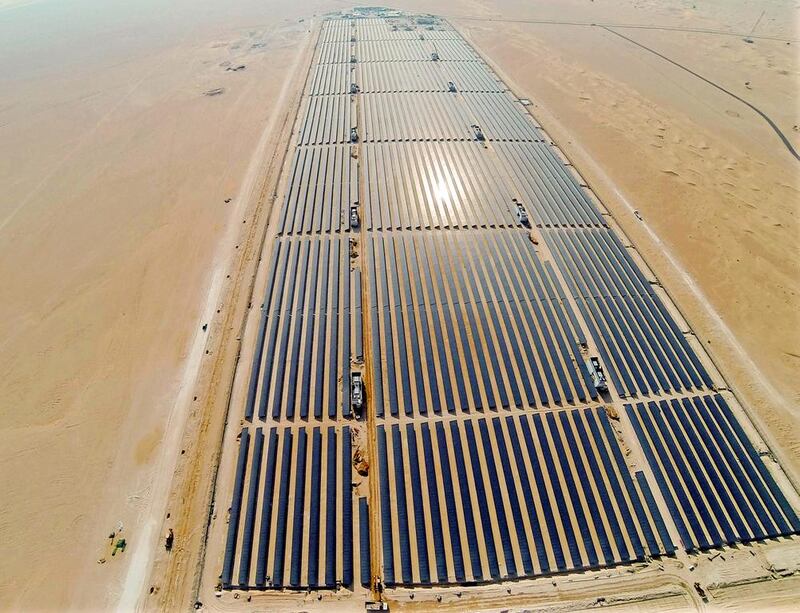While renewable energy includes wind, biofuels and hydropower, the main winner for this year has been solar energy. And the main regional winner has been the UAE.
"Both Masdar and the Dubai Electricity and Water Authority [Dewa] have proven to the world that developing and developed nations have to embrace renewable energy, especially solar energy, to empower a growing economy," said Hadi Tahboub, the vice president of the Middle East Solar Industry Association (Mesia), based in Dubai.
It all began in January last year, when Dewa increased its clean-energy target from 5 per cent to 7 per cent by 2020. That was quickly overshadowed by the world’s cheapest tariffs for solar energy at the Mohammed bin Rashid Al Maktoum solar photovoltaic (PV) park – all thanks to Riyadh-based Acwa Power and its partner, TSK of Spain.
The consortium submitted alternative bids for the 100 megawatts on offer and the deal was too good to pass up as Dewa announced that it would award the consortium 200MW at 5.84 US cents per kilowatt hour.
One reason that solar PV has become competitive on cost with conventional forms of power, such as natural gas, is because of the dramatic drop in prices for the technology.
Solar PV module prices fell by 75 per cent last year compared with five years ago, according to the International Renewable Energy Agency (Irena), based in Abu Dhabi. And from 2010 to 2014, the total installed costs of utility-scale PV systems fell by 29 per cent to 65 per cent, depending on the region.
Dubai didn’t stop there as it began paving the way for solar power to expand into commercial, industrial and residential sectors with its Shams Initiative. The five-prong approach debuted a net metering system, which allowed private owners and businesses to install solar energy based on the amount of electricity consumed on average by the individual or company. If an excess of power from solar is produced and fed back into the grid, consumers receive a credit on their next electricity bill.
And while everyone was preparing for the climate talks in Paris, also known as the 21st edition of the Conference of Parties (COP21), Dubai had another surprise.
The Dubai Clean Energy Strategy 2050 was launched and is expected to result in US$13.6 billion in new solar investments. For the third time, plans for the Mohammed bin Rashid Al Maktoum Solar Park were expanded. Originally, it was to have a capacity of 1,000MW and then at the beginning of the year, Dewa announced it would be 3,000MW. At the end of November, the park grew further to 5,000MW.
Under the same programme, the government has said that every roof in the emirate – approximately 114,000 of them – would be equipped with solar panels. According to Mesia, that would have a total value of $2bn.
In addition, a $27bn Dubai Green Fund is to be implemented to provide low-cost loans for solar rooftop investors.
Of course, COP21 had everyone sitting on the edge of their seats in December to see if the world would recognise, and sign, a global accord slashing carbon emissions and paving the way for more renewable-energy applications.
Well, it finally happened.
Leaders from 195 countries committed to cutting carbon emissions and limiting the rise in global temperatures to less than 2 degrees.
“The deal signed in Paris has the potential to fundamentally change forever the way the world generates and utilises electricity,” said Paddy Padmanathan, the chief executive of Acwa. “We welcome the commitment to rapidly move towards both ‘low’ and ‘no’ emission power generation.”
Mr Tahboub said that the UAE had made incredible strides in the global push to lower carbon dioxide emissions. “And not just by simple presence in flamboyant global summits but on-the-ground actions and tangible planning, both strategically and tactically,” he said.
On the books for next year – expect major advancements with the 800MW solar PV tender up in Dubai as well as Abu Dhabi Water and Electricity Authority’s 350MW project.
lgraves@thenational.ae
Follow The National's Business section on Twitter





